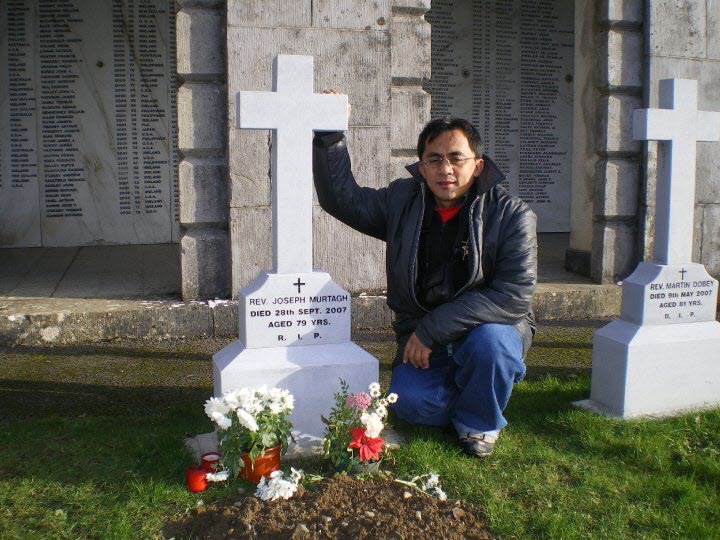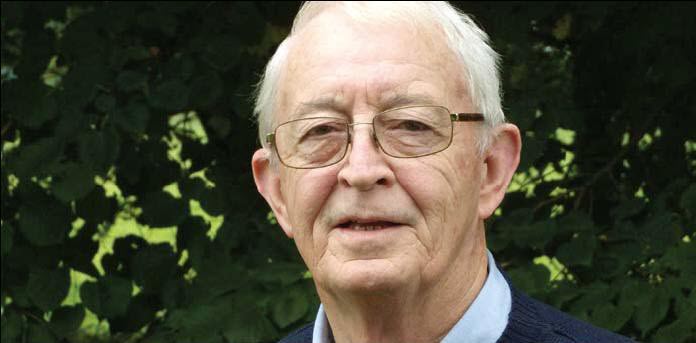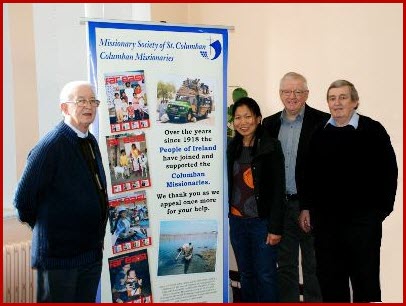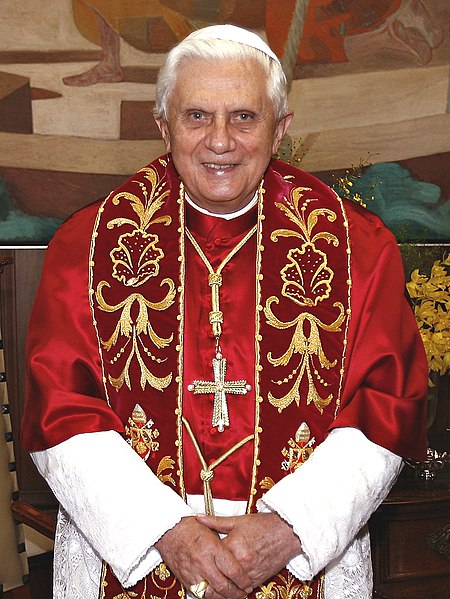Misyon Online - March-April 2013
Pulong ng Editor
By Fr Seán Coyle
A Close Encounter with the Columbans in the Third World
By Fr Jovito Dales
Father Jovito shares how his childhood wonder at the ‘huge house inhabited by white strangers’ in Ozamiz City led him ultimately to leave a good job in the bank and become a Columban priest in Peru. He is now back in the Philippines as vocation director. He will be very happy to hear from any young man interested in following his footsteps at seladmj@yahoo.com
‘I pray especially for you to have the gifts of the Spirit of Discernment and the Spirit of Mission.’ That was the prayer of Columban Fr Desmond Hartford when he confirmed me in January 1997 in the chapel of the Carmelite Sisters, Marawi City, Lanao del Sur. After finding no proof of my confirmation Monsignor Des, then Apostolic Administrator of the Prelature of Marawi, suggested that I be confirmed there. He looked for my baptismal godparents, whom I had never met. He eventually found them and brought them to the ceremony. That was an unforgettable event precisely because I was born and baptized in Marawi City in 1969, but grew up in Catadman, Ozamiz City, when we left the war-torn place in 1972.
Encounter with the White Strangers
My first encounter with the Columbans was during my elementary years. Going to school I passed by a huge house inhabited by white strangers. We called it ‘Ang Palasyo’, ‘The Palace’, as it was the biggest house in town. Those passing by were curious about the overwhelmingly big house, about those white men what they were they doing in our place. Their towering height seemed threatening to little kids like me. But I was not afraid of them because they were very nice. They tried to speak and ask questions in Bisaya, and would even laugh as they were corrected. I learned that they were missionary priests and that Ang Palasyo was the central house of the Columban Fathers in Ozamiz City. Most of the Columbans I met in Mindanao were people-oriented, lived a simple lifestyle, were very down to earth and courageous, and chose to stay despite the danger – things that captivated me as I was silently discerning my vocation.
‘Gracias a la vida que me ha dado tanto’
Come and See Where I Lived
By Fr Daniel O’Connor
|
|
The author is from New Zealand and was ordained in 1986. This article first appeared in the newsletter of the Pakistan Mission Unit of the Columbans. For many years he has been a long-distance runner.
As part of my Silver Jubilee sabbatical year I spent some time last June 2012 in the Holy Land. Descending out of the dark sky into the lights of Tel Aviv was symbolic. The next day
excitement increased as I boarded a bus for Nazareth. Being an adventurous Columban I had a wonderful, humble privilege of walking along the places that Jesus walked, called ‘Hiking the Jesus Trail’ and ‘The Jesus Marathon’.
As I walked through the alleyways and steps of the old city of Nazareth I reminisced that this was where Jesus played, walked, laughed, shed tears and worked for the first 30 years of his life on earth. Seeing children of olive-colored skin playing soccer on the side of the street reminded me that Jesus would have looked like them and played with his friends in those areas and drawn water from ‘Mary’s Well’.
Learning Some of What I Don’t Know
By Siobhan McCaffrey
|
|
Some Challenges and Possibilities in Collaborating with Teachers in Schools in Lahore, Pakistan, from the brief experience of a Northern Irish Primary School Teacher. The author wrote this article during her second visit to Pakistan. Her first visit, nearly a year earlier, was to visit the grave of her Columban uncle, Fr Pat McCaffrey. We published her account of that visit, Following in Father Pat’s footsteps in November-December 2012.
My uncle, Fr Pat McCaffrey, a Columban missionary, died suddenly in Pakistan in May 2010. Along with my brother Niall, I came to Pakistan the following Christmas to visit his grave. I decided to return again in November 2011, so this is my second visit. This time, even though I speak no Urdu, I wanted to be more included in daily life so looked for the opportunity to work with teachers and children in local schools in a Columban parish in Lahore. I have been working in the schools for just over three weeks and the following attempts to describe and evaluate this experience.
I approached the principal of one of the parish schools and asked her how I might contribute. She asked me to explain the basics of English grammar to the teachers, and also work with some of the older classes in the school. So, I spent the first week preparing a one-day seminar on the topic for 30 teachers.
My Life with the Columbans
By Virgenia Oral Vidad
|
|
Virgie’s involvement with the Columbans started when she was in college. She used to go with Fr Don Kill in selling and promoting Misyon on Sundays. She joined the Columban Familia Misyon under Columban Sister Tammy Saberon. It was an organization of college students who volunteered to visit children with disabilities in Ozamiz City in their homes. She now works with the Pedaling to Live community set up by Columban Fr Oliver McCrossan.
|
|
I come from a very poor family in Ramon Magsaysay, Zamboanga del Sur, my father being a farmer. He worked very hard to provide us with food. He usually woke up at 4am to work. My mother took care of us while we were studying. Sometimes she would help my father on the farm. At weekends my brothers and I would help him, especially during the planting and harvesting seasons. I can’t imagine how I survived the heat of the sun during the planting season.
When I was eleven I left home and went to Buug, Zamboanga del Sur, with my brother and was in Grade Six in Buug Elementary School. That was my first time to sleep without my mother beside me, a very painful year that helped me to grow more mature. I finished high school as a working student in Sominot National High School. I stayed in the house of one of my teachers so I didn’t have to spend for daily transportation. In spite of these difficulties in my elementary and high school years, I was determined to pursue college.
In June 1993 I enrolled for a Bachelor of Science in Computer Science at Immaculate Conception College, Ozamiz City (now La Salle University). I graduated as a working scholar in October 1997 and the following month started as a secretary of the President of the school.
Shahbaz Bhatti: 'I know what is the meaning of Cross'
By Fr Tomás King
Two years ago on 2 March Clement Shahbaz Bhatti, a Catholic and the only Christian member of the Cabinet in Pakistan, was assassinated in Islamabad just after he had left his mother’s house. Recently Fr Tomás King, Coordinator of the Columban Mission Unit in Pakistan, met Gerard Bhatti, a brother of Shahbaz, and wrote this article.
|
|
Shahbaz Bhatti was the youngest in a family one sister and five brothers. They were born in the Catholic village of Khuspur, near the city of Faisalabad in the Punjab. Khushpur means ‘Happy Land’. It was named after its founder, Father Felix, a Capuchin missionary, his name being the Latin for ‘happy’. The village was founded in 1900. It is one of 53 such villages founded throughout the country by various missionary congregations, mostly before the partition of 1947. The founding of these villages made a huge impact on the sense of dignity and self-worth of an oppressed group of people. Khushpur has produced two bishops and many priests and sisters. It is also the home of the National Catechists Training Centre.There are 300 families in the village.
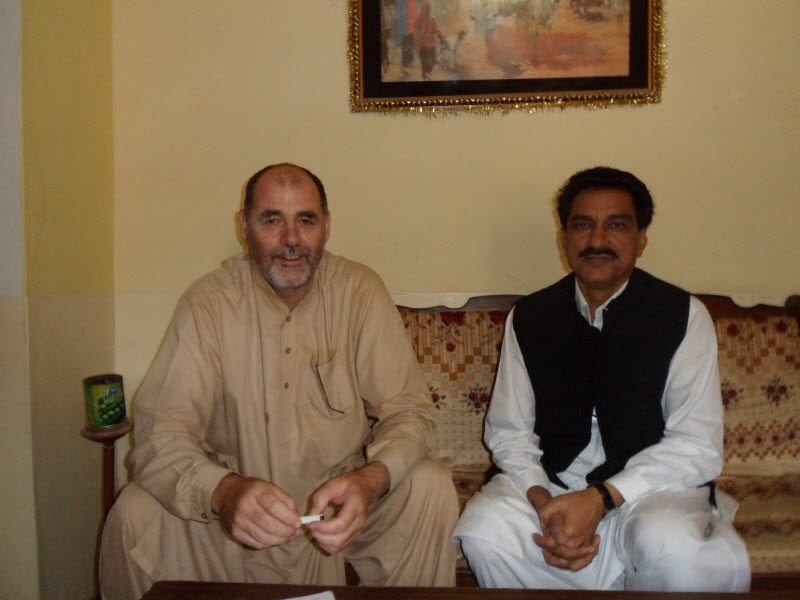 |
|---|
Jaclyn, the only sister, was the first-born, followed by Paul, who was appointed Federal Minister for Minorities Affairs after the death of his brother, Peter, Gerard, Sikandar and Shahbaz, whose Christian name was Clement. The family owns four acres of land, now farmed by Sikandar. His mother is still alive while his father, Jacob, died only weeks before his martyrdom. Christian or ‘Western’ names were usually given by the missionaries. The two youngest children being given Sub-continent names maybe reflects the need to fit in as the country gradually became more Islamised.
Despite being implored to the contrary, in his 20s Shahbaz decided not to marry so as to devote his life to the struggle for human rights of the oppressed and for justice and peace, which wa a very counter-cultural commitment to make.
"
His only sister, a brother, nieces and a nephew speak about Shahbaz Bhatti.
Pulong ng Editor
By Fr Seán Coyle
Minister Bhatti, you forgot one question in the interview. Your life is threatened by whom and what sort of threats are you receiving?
The forces of violence, militant banned organizations, the Taliban, and Al Qaeda, they want to impose their radical philosophy on Pakistan. And whoever stands against their radical philosophy that threatens them, when I’m leading this campaign against the Sharia Law, for the abolishment (abolition) of (the) Blasphemy Law, and speaking for the oppressed and marginalized, persecuted Christian and other minorities, these Taliban threaten me.
But I want to share that I believe in Jesus Christ who has given his own life for us. I know what is the meaning of (the) Cross and I’m following of the Cross and I am ready to die for a cause. I’m living for my community and suffering people and I will die to defend their rights. So these threats and these warnings cannot change my opinion and principles. I will prefer to die for my principle and for the justice of my community rather (than) to compromise on these threats.
Come and See Where I Lived
By Fr Daniel O’Connor
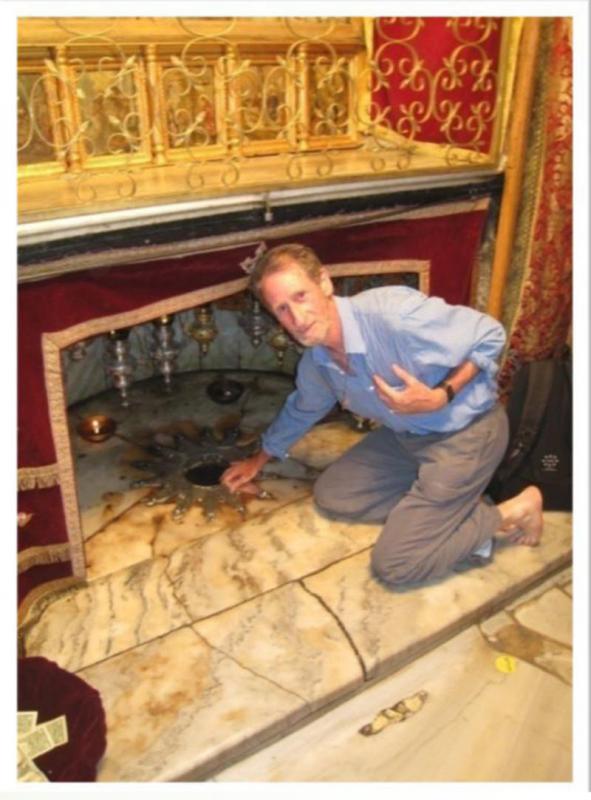
Fr O’Connor at the birthplace of Jesus, Bethlehem.
The author is from New Zealand and was ordained in 1986. This article first appeared in the newsletter of the Pakistan Mission Unit of the Columbans. For many years he has been a long-distance runner.
As part of my Silver Jubilee sabbatical year I spent some time last June 2012 in the Holy Land. Descending out of the dark sky into the lights of Tel Aviv was symbolic. The next day
excitement increased as I boarded a bus for Nazareth. Being an adventurous Columban I had a wonderful, humble privilege of walking along the places that Jesus walked, called ‘Hiking the Jesus Trail’ and ‘The Jesus Marathon’.
As I walked through the alleyways and steps of the old city of Nazareth I reminisced that this was where Jesus played, walked, laughed, shed tears and worked for the first 30 years of his life on earth. Seeing children of olive-colored skin playing soccer on the side of the street reminded me that Jesus would have looked like them and played with his friends in those areas and drawn water from ‘Mary’s Well’.
It was a humble privilege to concelebrate Mass in the Basilica of the Annunciation. On the road to Mount Precipice the traditional site of the cliff that an angry mob attempted to throw Jesus over, after his bold proclamation in the Nazareth synagogue I too experienced some anxiety after some interrogation. With pack on back I walked over miles and miles of hills and villages on the ‘Jesus Trail.’ I roughed it and went off course a few times, yet had captivating and treasured times beating the feet through Nazareth, Zippori, Cana, Tiberius, Tabgha, Capernaum, the Mount of the Beatitudes, Mount Precipice, Mount Tabor and others. In Cana I slept on a roof, keeping an eye open for safety reasons. Then early in the morning after praying the Mass with the Syrian Franciscan priest, ate a healthy breakfast with a glass of Cana wine which gave me energy to head for Capernaum and Tiberius. In Jesus’ time Capernaum was where he was based for the three years of his public ministry. At that time its population was estimated at 15,000.
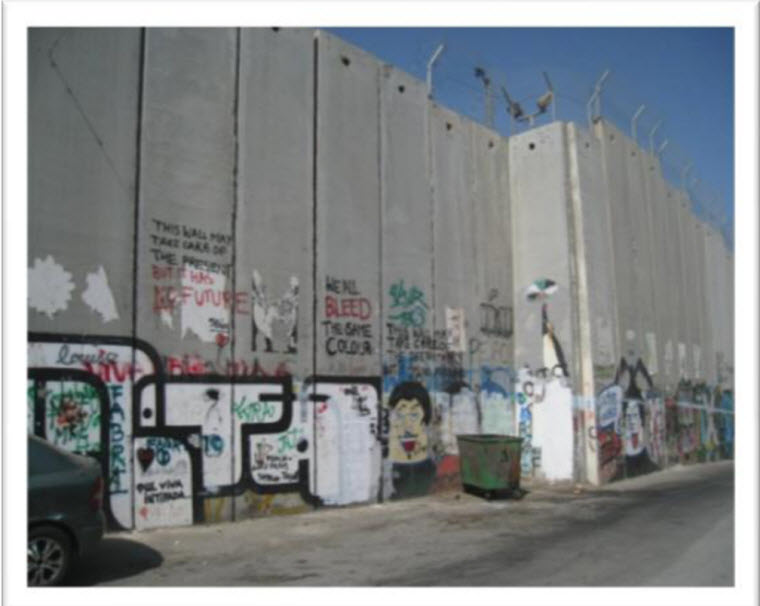
Part of the Israeli West Bank Barrier
I expected a town with places for food and accommodation but no such luck. There were only a couple of churches with a few people living near them. The outer gate of the Franciscan church was closed for the evening. I retraced my steps and begged a shopkeeper on the banks of Galilee lake/sea to open up again, to which he kindly obliged. I slept that night on Mother Earth with some fear of dogs barking yet recalling the words of Jesus: ‘Foxes have holes, the birds of the air have nests but the Son on Man has no place to lay his head’.
Early next morning when the outer gate opened I entered and knocked on the door of the house. After some time a Franciscan priest opened the door and eventually asked, ‘But
where do you live?’ I replied that people asked Jesus, ‘Where do you live? And I have come to see where he lived’.
After a refreshing swim in the waters of Galilee it was time to take the road to Jerusalem. I felt some sadness on ascending a hill and looking back towards the waters of Galilee and Capernaum recalling that Jesus himself must also have felt that parting deeply as he took the road to Jerusalem. A puff of wind on my face on climbing to the top of the lovely Mount Tabor, the traditional place of the Transfiguration, was enough of feeling the presence of God who comes also in the gentle breeze. I recalled the words, ‘This is my son, the Beloved; he enjoys my favor. Listen to him’’
On trekking from Jerusalem towards Bethlehem I was confronted in my tracks by the high wall which weaves its way through parts of Israel and Palestine. I felt much tension there, though on showing my passport I was permitted to continue on my way to Bethlehem. There I waited my turn to touch the traditional place where Jesus was born. A walk to the Shepherd’s Field was invigorating. ‘You need a taxi to go back to Bethlehem’, I was told. I opted for the walk, like the shepherds and the sheep!
Spending time journeying through the Old City of Jerusalem was captivating. The walled city, The Via Dolorosa with the people dressed in different cultural/religious garb was a most interesting place. A few precious minutes in the small tomb where Jesus is said to have been laid and the place of Resurrection and I reflected: ‘Tis it and I am here’. I am here in the sacred place of the Mystery of Life, of God, Death and Resurrection.
Then through Gethsemane, the Church of the Pater Noster and after many inquires I found the Church of the Ascension, a small run-down round building with only two friendly young Muslim men there. It was, though, an exciting missionary experience feeling once again empowered in the missionary call to ‘go to the ends of the earth and proclaim the Good News to all Creation’.
It was truly a wonderful blessing to be able to respond to the invitation from Jesus, ‘Come and see where I live’. The reflected experiences God has gifted me with have made a deep impression on me for which I am eternally grateful.
You may contact the author at danieldoconnor@hotmail.com
Learning Some of What I Don’t Know
By Siobhan McCaffrey
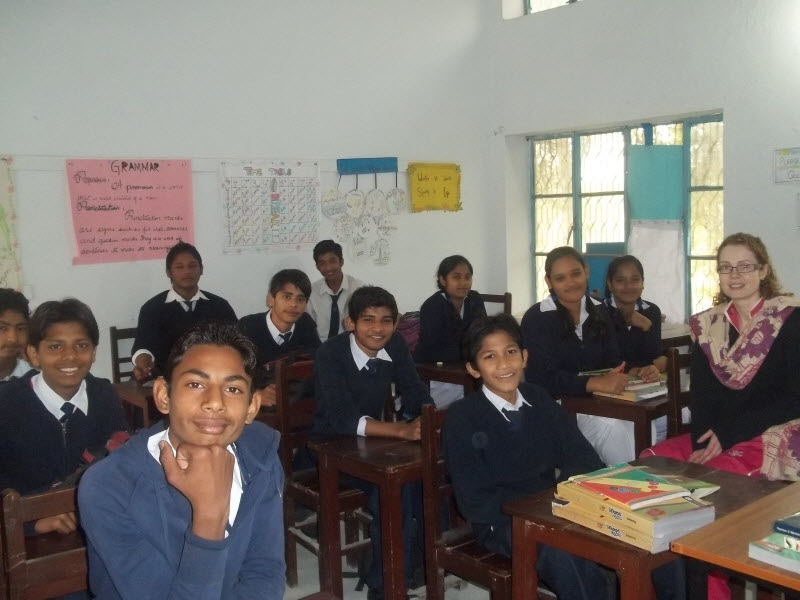
With some of the teachers from St Paul's High School in Greentown
Some Challenges and Possibilities in Collaborating with Teachers in Schools in Lahore, Pakistan, from the brief experience of a Northern Irish Primary School Teacher. The author wrote this article during her second visit to Pakistan. Her first visit, nearly a year earlier, was to visit the grave of her Columban uncle, Fr Pat McCaffrey. We published her account of that visit, Following in Father Pat’s footsteps in November-December 2012.

Sacred Heart Cathedral, Lahore
My uncle, Fr Pat McCaffrey, a Columban missionary, died suddenly in Pakistan in May 2010. Along with my brother Niall, I came to Pakistan the following Christmas to visit his grave. I decided to return again in November 2011, so this is my second visit. This time, even though I speak no Urdu, I wanted to be more included in daily life so looked for the opportunity to work with teachers and children in local schools in a Columban parish in Lahore. I have been working in the schools for just over three weeks and the following attempts to describe and evaluate this experience.
I approached the principal of one of the parish schools and asked her how I might contribute. She asked me to explain the basics of English grammar to the teachers, and also work with some of the older classes in the school. So, I spent the first week preparing a one-day seminar on the topic for 30 teachers.
I had not prepared resources or equipment so initially presumed I would have to do everything with blackboard and chalk. However I discovered the school had a data projector and I was able to use the internet connection in the Columban house to download resources. The topic of the seminar was basic grammar, handwriting and phonics. In Ireland I only teach up to eight-year-olds so felt a little out of my depth preparing to work with older students, much less with teachers.
I soon realised that my own understanding of English grammar is inadequate, in that I am unfamiliar with many technical details. For example, I was unaware that there are a number of kinds of past tense eg, past perfect, past perfect progressive, past perfect continuous, and presumed the tenses were simply, past, present and future. The teachers began asking me questions about the various kinds of past tense and I was at sea. I knew what was correct because of how it sounded but could not explain why something was correct or incorrect. One combination of verbs that puzzled my Pakistani friends and stumped me when asked for an explanation was the association of ‘have’ and ‘had’ in a phrase such as: ‘I have had a good time’. The teachers said to me: ‘“have”’ is present tense and “had” is past tense, so how can they stand together?’ I did not know how to answer using the technical language they needed.
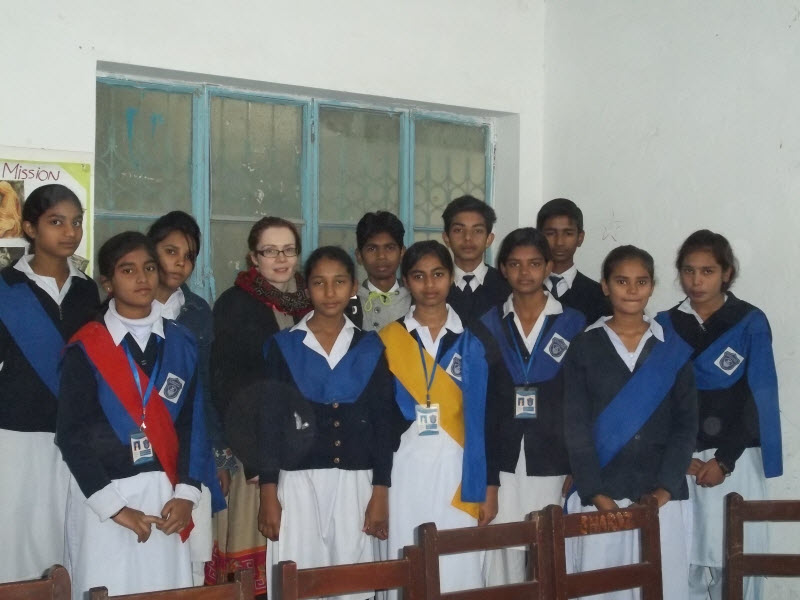
Siobhan with students
Some teachers seemed to have a very good technical understanding of English even though they may not be fluent speakers. That challenged me and I soon realized that to do more work in this line I would need to update my knowledge of English grammar. A weakness in the English language learning system in Pakistan that seems to have been in place here for many years is the tendency to emphasise an appreciation and understanding of the technicalities of the language to the detriment of fostering the ability to speak it. Colloquialisms and regional developments are hardly taken into account.
Overall the seminar went well but I had little feedback from participants during the first part so I wondered whether or not I was communicating with them but things warmed up later in the day. Subsequently, during some afternoon sessions, I worked through the content of the seminar with a smaller group of secondary school teachers and it went very well as many of them have quite good English and were keen to further improve it.
I also received a request to teach story writing but did not get around to it due to other requests from the teachers. However I did wonder how I might tackle such a task, given the limited vocabulary of the teachers and also their inadequate understanding of how to say things in fluent English.
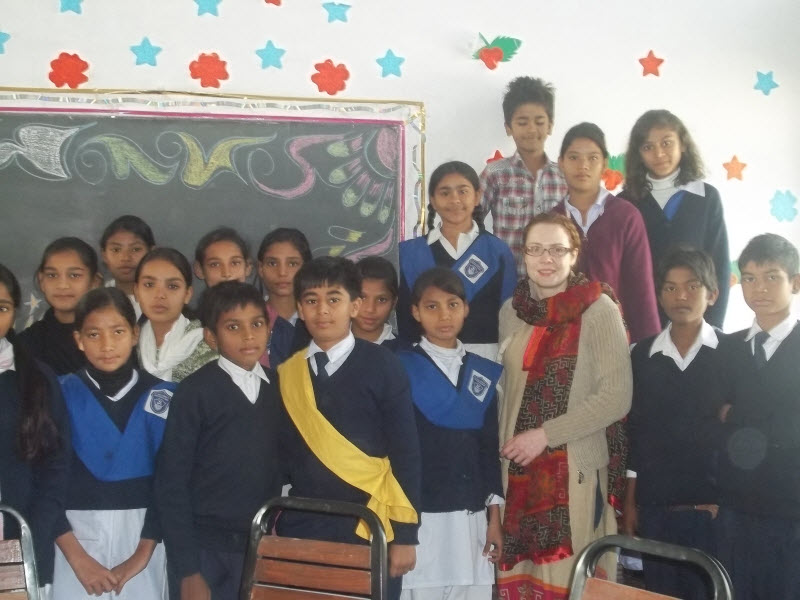
Siobhan with students
I visited other schools in the parish but felt that our communication was poor. I feel that, in order to communicate via English, participants need a certain level of proficiency that in fact some did not have, especially in the schools where English is not the medium of instruction. Even where English is the medium school texts are often in both English and Urdu and teachers frequently resort to Urdu to ensure that students understand the topic of the class.
For me, it was more rewarding to work in the school where English is the medium of instruction. Communication was clearly better and we managed to generate a level of enthusiasm throughout the class period, so I knew the participants understood what was being discussed.
In the classrooms I did some work on English conversation and grammar. I found that students seemed to be caught into learning material by rote without necessarily understanding the content. However, I did have some conversations with students aged from 12 to 15 years in which they responded quite well. This worked especially well when their teacher was present in the classroom to support the students whenever we reached a blockage to mutual understanding. In other cases where the teacher simply translated between students and me I don’t think anything was achieved. In such instances, maybe the students did not know enough English or have any confidence in what they did know to even begin to converse.
Both students and teachers were in general most welcoming but where they lacked confidence in their ability to communicate in English both seemed to hold back. I think I was able to contribute most effectively when the principal or teachers told me what they needed and I was given time to prepare something. If I had known before leaving Ireland what the schools might have expected from me I am sure I could have come here much better prepared.
The experience has moved me deeply. I have felt welcomed and included. So many have so little and yet they readily show warm hospitality. The hardship of poverty, insecurity and discrimination as a minority group (Christians) saddens me but I have found the Pakistanis to be so resilient and strong in the face of adversity. This visit has also made me feel grateful for having been born in western society where we have and take for granted a free education system, a free health care system, good service from public utilities and relatively comfortable way of life. At times I wonder whether we appreciate what we have.
You may contact the author at siobhanreagh@hotmail.com
My Life with the Columbans
By Virgenia Oral Vidad

The Beneficiaries
Virgie’s involvement with the Columbans started when she was in college. She used to go with Fr Don Kill in selling and promoting Misyon on Sundays. She joined the Columban Familia Misyon under Columban Sister Tammy Saberon. It was an organization of college students who volunteered to visit children with disabilities in Ozamiz City in their homes. She now works with the Pedaling to Live community set up by Columban Fr Oliver McCrossan.

Father Oli with children in the community.
I come from a very poor family in Ramon Magsaysay, Zamboanga del Sur, my father being a farmer. He worked very hard to provide us with food. He usually woke up at 4am to work. My mother took care of us while we were studying. Sometimes she would help my father on the farm. At weekends my brothers and I would help him, especially during the planting and harvesting seasons. I can’t imagine how I survived the heat of the sun during the planting season.
When I was eleven I left home and went to Buug, Zamboanga del Sur, with my brother and was in Grade Six in Buug Elementary School. That was my first time to sleep without my mother beside me, a very painful year that helped me to grow more mature. I finished high school as a working student in Sominot National High School. I stayed in the house of one of my teachers so I didn’t have to spend for daily transportation. In spite of these difficulties in my elementary and high school years, I was determined to pursue college.
In June 1993 I enrolled for a Bachelor of Science in Computer Science at Immaculate Conception College, Ozamiz City (now La Salle University). I graduated as a working scholar in October 1997 and the following month started as a secretary of the President of the school.
In 1999 I began work with the Community of Hope Special Education Center, under the Columban Sisters, which is for children with different disabilities. That was very challenging for me since I didn’t have any experience in this area. But Sister Clement Sheehy helped me and sent me for further training. I worked at the Center for five years during which I learned to give importance to the less privileged.

Full view of green shelter
Though I was a full-time staff member I was also a volunteer in Fr Oliver McCrossan’s Pedaling to Live project. Sister Clement went to Ireland for good and a new administration was set up at the Center. Due to lack of funds there was a retrenchment. I lost my job and it wasn’t easy. I was helping my sister through college at the time.
But God is good. I received a phone call from Fr McCrossan who was in Ireland. He asked me if I would like to work with him. I immediately accepted without asking what my work was going to be. When he arrived back in Ozamiz in 2004, I started working with him. He said, ‘We don’t have an office. All you have to do is to work in the community, especially with the tricycle drivers’. I was shocked, I had no idea where and how to start.
Working with Fr Oli and in the community of the tricycle drivers wasn’t just ordinary work. I was happy being with the families. Seeing their smiles every time I met them told me that the project was a great help to them.
In 2006, I married Bodoy. We’ve been blessed with two children, a girl and a boy. I usually leave them at 7:30 in the morning and go home at 5 or 6 in the evening. It’s not easy to be a working mother. I know at their age my children still need my time so I try to make my free time meaningful to them. Sometimes I bring my older child to the community of the pedicab drivers for her to understand the nature of my job. It’s hard to balance my time, especially as my husband is also working and can come home only at weekends. I try as much as I can to bring my daughter to school before I go to work and fetch her at noon.

Virgie and Bodoy with their children.
I read stories to my kids before bedtime. Every Sunday is our family day. After Mass we go for lunch and then to the Cotta Shrine or the playground. For me the week is not complete if I can’t spend time with my family on Sundays. Watching my kids playing wipes away my tiredness. I am very thankful to my husband for his understanding about the kind of work I have. The success that we’ve made with the project really makes me happy. At the end of the day I always thank the Lord for giving me strength, especially during tough times.
My commitment and love for my job motivate me in giving of my best. This is not only for my own family, but for those of the Pedaling to Live drivers. Their laughter gives me strength to work hard. Listening to their struggles in life gives me inspiration to keep going. I am very thankful that I was given the opportunity to work with them. Because I am from a poor family I want to be involved with people who are less fortunate.
The dream of our families in the community to have a decent home and live harmoniously has come true! Before Father Oli left for Ireland last year, we had only eight units built but now we have 14. The houses are made from local materials: clay, rice straw, rice husks. We call them earthen buildings. We encourage the beneficiaries to help in constructing them. We call this ‘pahina’, working together as a way of building strong relationships with each other. A small multi-purpose hall with two bedrooms and a kitchen has also been completed. It is used for meetings and recollections. Part of it serves as a playroom for the children.
An orientation seminar on policies and regulations is conducted for new members of the housing project. The elected officers have regular monthly meetings to discuss plans and improvements in the community. Recently, officers and other beneficiaries participated in an organizational management skills training workshop. Partners from other non-government organizations helped us in this. We also organized local benefactors to be part of the project, to ensure not only the financial welfare of the members but, most importantly, their spiritual well-being.
After six years in the Pedaling to Live project I can say my job is very fulfilling. I am very thankful to the Columbans, especially Father Oli. I’ve learned a lot from him, his patience, his respect for others, his humility and how he values little things. We are working hand in hand with people from other countries who are also helping to make this work a success.
Our Hideaway
Christi Simus Non Nostri, Let us be of Christ not of ourselves
By Churchill Aguilar
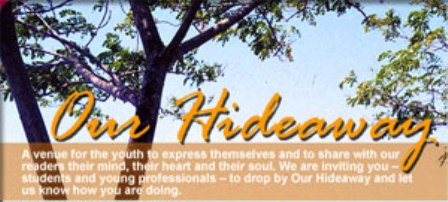
|
|
The author, who lives in Cagayan de Oro, was a Columban seminarian during his college years. He contributes regularly to the Mindanao Gold Star Daily, where this article first appeared. He wrote about his late sister in Remembering Ate Bem in the September-October 2012 issue of Misyon.
My last project left me so exhausted that I could not even write an evaluation report two days after it culminated. So I decided to grab the strongest coffee at my favorite coffee shop in Centrio Mall. Coincidentally, I met two missionary priests who were once my brothers in the Columbans. The bond we had brought me back to my seminary years. Let me share with you my vocation story.
Fifteen years ago, Fr Bernard Steed, an Irish Columban, visited my high school with his ‘magic bag’. From it he took lots of stuff, with each piece of which he shared stories of young men who crossed boundaries to experience the adventure of their lives. I couldn’t help but be drawn to the spirit in him as he passionately narrated how his friends broke the boundaries of language and culture and found happiness in far flung areas of the world.
A few months later, the experience shook me enough to change the career plans that I had prepared for years, to my Dad’s disappointment. I left my family to join Father Bernard’s group, the Missionary Society of St Columban. There I saw and experienced what he had shared in his stories; I had a good run.
|
|
Once a week for a year I worked with patients in the psychiatric ward of Vicente Sotto Memorial Medical Center, Cebu City. (We Columban seminarians were studying at the University of San Carlos). I was dead scared when I started. I thought any patient there could choke me to death or knock me down with single blow; things like that can happen there. To top this, I had nothing to offer them other than making more crowded their already overcrowded ward. Yet as weeks passed, I gained friends with whom I got to talk in their lucid moments.
There was also a year where I worked with street children. In Cebu City, the city government does not like children wandering around the streets because it is not good for tourism. Well, of course, no kid really belongs on the streets; not only that, it’s dangerous, and they’re supposed to be with their families. Anyway, I would meet them at a drop-in center in Pari-an. Again, I really had nothing to give them other than my time, which I spent mostly in playing basketball. I can still remember going home so dirty and so stinky; but the smiles of those kids were just priceless.
My most challenging year was when I worked with the Deaf community. There I was silenced. A simple ‘How are you?’ would take me five minutes to respond to. While everybody else could understand each other, I was always ‘lost in translation’. What moved me was their patience in teaching me their language and their eagerness to make me part of their world.
|
|
I also worked in a squatters’ area in Barrio Luz. I got into a den of thieves and drug-pushers. Every time I walked those narrow alleyways people would stare at me with much suspicion. For them I was either a buyer or a policeman. They were understandably paranoid knowing that raids were conducted in the area almost on a monthly basis. Eventually when I became a familiar face I got their smiles.
In my last year with the Society, I worked in a dumpsite in Tayuman taking care of the dying and the destitute. Then I decided to leave the seminary for good.
In those five years I barely had anything in my pocket, yet I experienced life to the full. I witnessed life in its purest sense, a life worthy of celebration. Yes, I had nothing, and somehow it was more than enough. I look back on my experience with fond memories. And every time I am asked whether I regretted joining the Society or leaving it, I say ‘Why would I?’ It taught me the essence of life and prepared me for a higher calling.
Our Society’s patron saint is St Columban, an Irish missionary who said, ‘Christi simus non nostri’, ‘Let us be of Christ, not of ourselves’.
You may email the author at chrchl@yahoo.com and find him on Facebook.
Peace By Peace
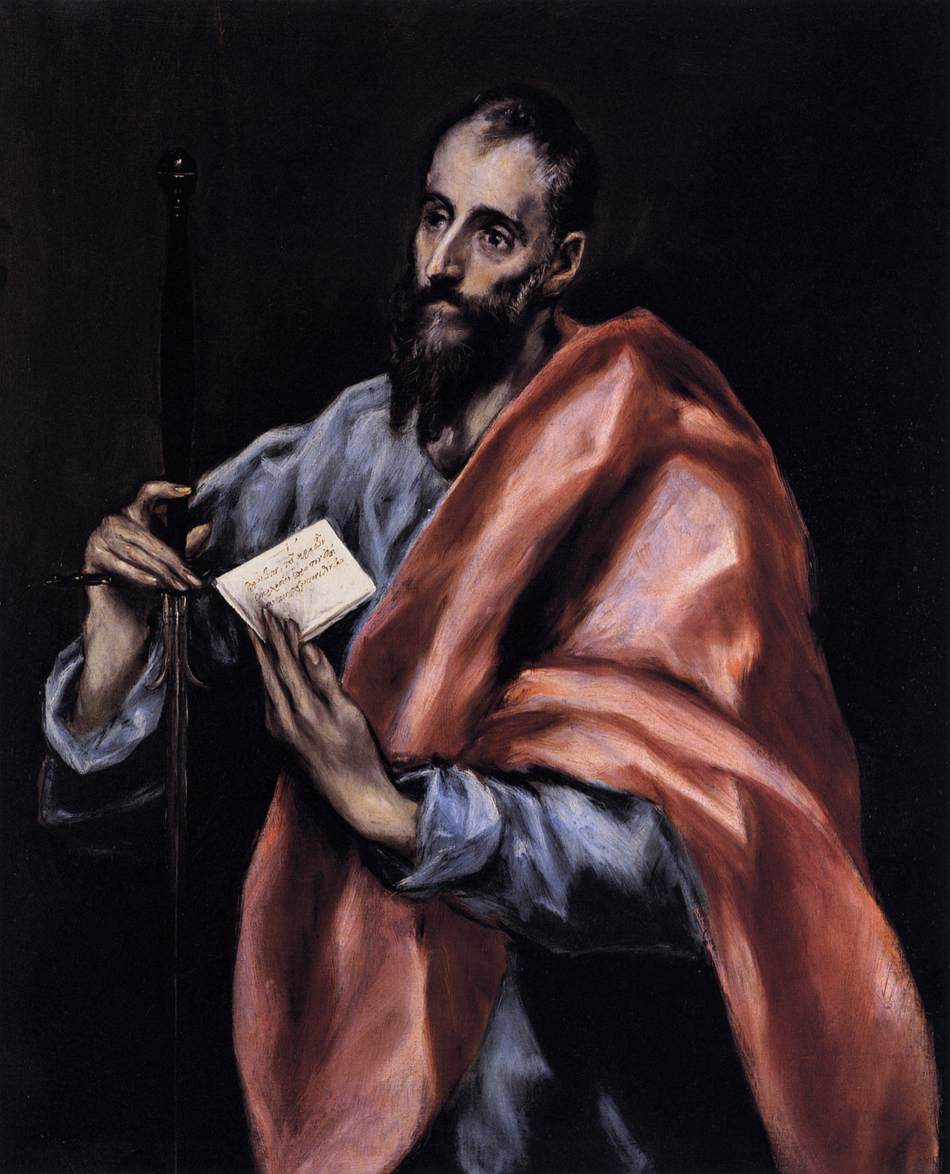 |
~ Ephesians 2:14-16 (Christian Community Bible) ~
Apostle St Paul, El Greco, 1610-14 (Web Gallery of Art)
From a letter Sister Thérèse carried on her heart on the day of her profession, 8 September 1890:
 Basilica of St Thérèse in Lisieux |
~ St Thérèse of Lisieux, Story of a Soul (translated by John Clarke OCD, p275) ~
The First Movement of the Dance with God
Let me be your dance master for a while! The first movement is forgiveness. It’s a very difficult movement. But, then, all beginnings are difficult, and there is so much forgiving to do. We have to forgive our parents for not being able to give us unconditional love, our brothers and sisters for not giving us the support we dreamt about, our friends for not being there for us when we expected them. We have to forgive our church and civil leaders for their ambitions and manipulations. Beyond all that, we have to forgive all those who torture, kill, rape, destroy – who make this world such a dark place. And we, ourselves, also have to beg forgiveness. The older we become, the more clearly we see that we, too, have wounded others deeply, and are part of a society of violence and destruction. It is very difficult to forgive and to ask for forgiveness. But, without this, we remain fettered to our past – unable to dance... Forgiveness enables us to take the first step of the dance.
~ Henri J. M. Nouwen, The only necessary thing: living a prayerful life, compiled and edited by Wendy Wilson Greer ~
Fr Henri J.M. Nouwen (1932 – 1996) ending a talk on The Life of the Beloved.
|
|
|
|
|
|
|
|
The Fight That Conquers WarBy Marianne Moore (1887 – 1972)The world's an orphans' home. Shall O quiet form upon the dust, I cannot Hate-hardened heart, O heart of iron |
|
O Lord, increase my sufferings and my patience!~ St Pius V (1504 – 1572) ~ |
|
Shahbaz Bhatti: 'I know what is the meaning of Cross'
By Fr Tomás King

Shahbaz Bhatti
(9 September 1968 – 2 March 2011)
Two years ago on 2 March Clement Shahbaz Bhatti, a Catholic and the only Christian member of the Cabinet in Pakistan, was assassinated in Islamabad just after he had left his mother’s house. Recently Fr Tomás King, Coordinator of the Columban Mission Unit in Pakistan, met Gerard Bhatti, a brother of Shahbaz, and wrote this article.
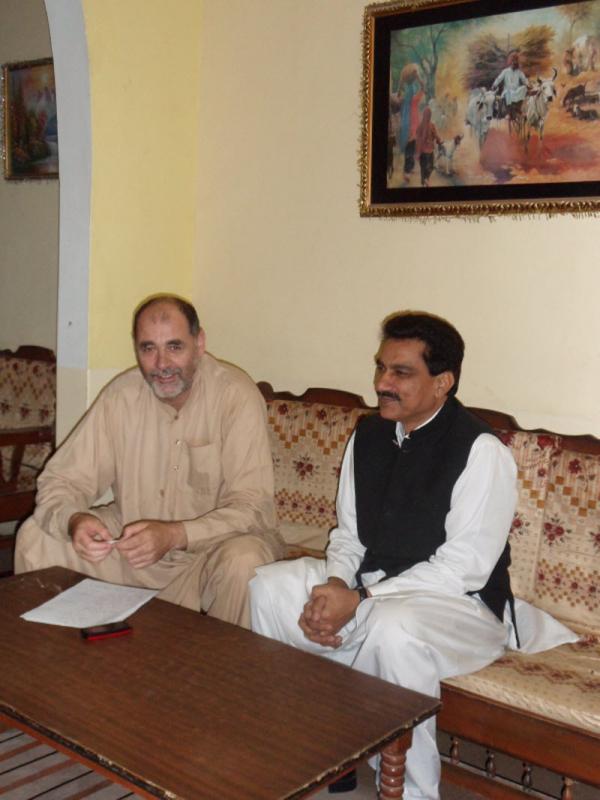
Shahbaz Bhatti was the youngest in a family one sister and five brothers. They were born in the Catholic village of Khuspur, near the city of Faisalabad in the Punjab. Khushpur means ‘Happy Land’. It was named after its founder, Father Felix, a Capuchin missionary, his name being the Latin for ‘happy’. The village was founded in 1900. It is one of 53 such villages founded throughout the country by various missionary congregations, mostly before the partition of 1947. The founding of these villages made a huge impact on the sense of dignity and self-worth of an oppressed group of people. Khushpur has produced two bishops and many priests and sisters. It is also the home of the National Catechists Training Centre.There are 300 families in the village.
Jaclyn, the only sister, was the first-born, followed by Paul, who was appointed Federal Minister for Minorities Affairs after the death of his brother, Peter, Gerard, Sikandar and Shahbaz, whose Christian name was Clement. The family owns four acres of land, now farmed by Sikandar. His mother is still alive while his father, Jacob, died only weeks before his martyrdom. Christian or ‘Western’ names were usually given by the missionaries. The two youngest children being given Sub-continent names maybe reflects the need to fit in as the country gradually became more Islamised.
Despite being implored to the contrary, in his 20s Shahbaz decided not to marry so as to devote his life to the struggle for human rights of the oppressed and for justice and peace, which was a very counter-cultural commitment to make.
"
His only sister, a brother, nieces and a nephew speak about Shahbaz Bhatti.
From an early age Shahbaz showed leadership abilities. Even as a teenager in high school he spoke out against the oppression of his Christian community.A defining moment in his consciousness seems to have occurred in his late teenage years when some Muslims tried to take over land owned by Christians. Then he started the Christian Liberation Front, the first of many organisations he was to either found or belong too.
An exposure in Khushpur for journalists in the context of inter-faith affairs. It includes a visit to the grave of Shabhaz Bhatti.
He was committed to individual daily prayer as well as regular attendance at the Eucharist. Psalm 23, The Lord is my Shepherd, was a favorite of his, especially in latter years when his life was under threat. This highlights an important dimension of inculturation in the Church in Pakistani, especially those coming from the Punjabi community: the Psalms were translated at an early stage into Punjabi and are sung like lively folk songs. They are deeply embedded in the spirituality of the people. Devotion to St Anthony of Padua is also an important part of the spirituality of Pakistani Christians.
Shahbaz graduated from high school in his home village. From there he went to the nearby city of Faisalabad for his pre-university courses, then to Lahore to study for a degree in science. All the time he was involved in human rights issues.
Shahbaz Bhatti speaking at Christian Solidarity Worldwide’s conference, 2009.
In 2002 he was elected as a member of the National Assembly and became the first Christian to be a full federal minister after the elections in 2008. He used this position to campaign against the Blasphemy Laws, as well as dialogue with all people of good will committed to human rights and justice.
He knew his life was in danger and his family warned him many times and urged him to leave the country.He refused to do so. As a faithful disciple of Jesus who gave his life, Shahbaz too felt he must continue his struggle, no matter the consequences. He got to know deeply the meaning of the cross. He is considered a martyr by the Christian faithful and people pray to him, and some claim their prayers have been answered.
Some people have been arrested but nobody has been charged with his murder. His life is symbolic of the bigger picture of the Pakistan reality.

Fr Tomás King and Gerard Bhatti
In Khushpur, on the occasion of his second death anniversary there will be prayers memorials, programs and seminars in his memory. As years go by it is hoped that the significance and meaning of Shahbaz’s life and death will be understood more deeply.
When the government offered Shahbaz’s Ministry for Minorities Affairs to the family, they chose Paul as the oldest son to carry the vision and legacy of Shahbaz forward. Paul is a medical doctor by profession.
Gerard himself has received death threats by phone. He is actively involved in his adopted Cathedral parish of Hyderabad, many miles from his home village of Khushpur.
‘Home is where you are understood’
By Fr Michael Martin
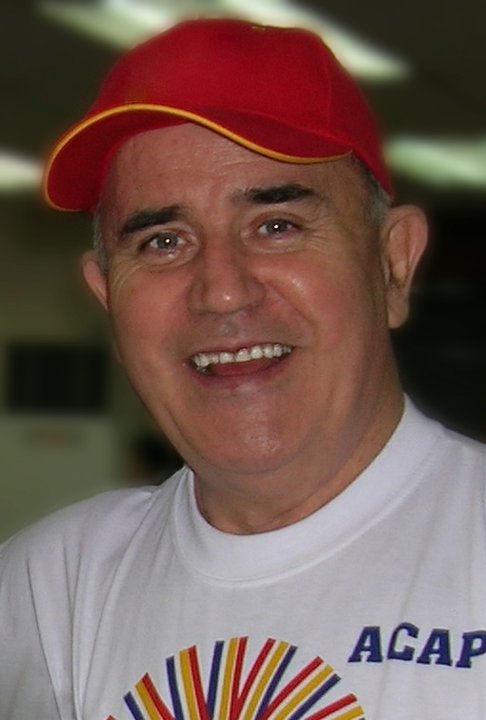
Fr Michael Martin
Though it’s not Christmas Time, Fr Michael Martin’s Christmas email to his friends last December reminds us how central to the lives of followers of Jesus is an awareness of God’s loving presence in our lives and a deep sense of gratitude for that.
Dear Family and Friends,
‘Home is where you are understood’ - a quote which constantly reminds me that I am blessed with two homes: in Ireland, and in the Philippines. I've had countless life-giving, happy experiences of being loved and understood, and I’ve felt the pain of separation too. Worlds apart, both nations are thankful; both are faith-filled; both rejoice in St John’s words: ‘See what love the Father has poured out on us that we be called children of God. That is what we really are’.
2012 marks the Golden Jubilee of the opening of the Second Vatican Council (Vatican II). The bishops of the whole world met in Rome each year for four years. And it was actually within days of the end of Vatican II that my classmates and I were ordained priest-missionaries. It was a privilege to be called and sent as disciples of Jesus to witness to God’s love and compassion to other nations. Listening to the pain of the world, as in violent or meaningless deaths, was always heavy; trying to do it in another language was humbling. Every step was a challenge. But the outpouring of the Spirit, so obvious in Vatican II, urged us on. We often laughed at our own mistakes and insensitivity; and we shed tears in the face of misery alongside shameless greed.
Father Mickey with Columban Lay Missionaries.
Now I am 72-and-a-half, and lucky enough to have that ‘half’ because of a blocked stent! I enjoyed the six months of the Irish Missionary Union’s Sabbatical Program which helped me to rejoice in my life journey and mission experience, and practice growing old gracefully. To all who made these luxuries possible, and to those who restored me to health, a thousand thanks. And thank God for modern medicine. I tried to act my age, cancelled many trips and visits, got medical approval, and arrived back home in Manila on 20 September. I have settled in to a reduced workload and a recipe for more rest, golf, and contemplation. I am very happy to be back.
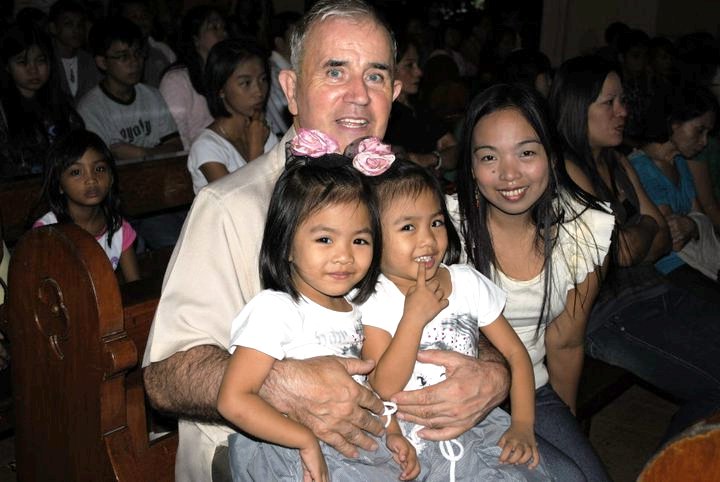
Father Mickey with young friends.
Awareness exposes and prevents abuse, in whatever form it appears. Today, thankfully, awareness of child abuse is high. Sadly, this is not yet true of our abuse of God’s creation. Our consumerism is destroying the environment on which our life depends. Inspired by this Year of Faith, the great work today is to begin healing, and stop destroying, our planet.
My prayer is that your life will be happy and fruitful, and a real blessing to many others. Please pass on my greetings to friends whose email addresses I do not have. All of us are invited to celebrate the Savior’s birthday, and all are invited to the banquet of the Lord.
A Blessed and a Happy Christmas be yours! Thank you for being a part of my life.
God is with you. This note is just a reminder.
(Father) Michael Martin
